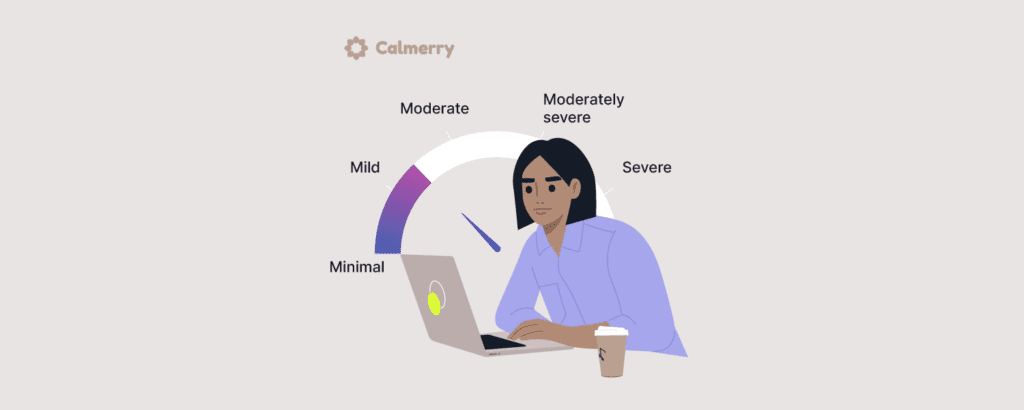5 Tests to Check the State of Your Mental Health

In this article
When you notice that issues like stress, feelings of sadness, or relationship conflict are beginning to interfere with everyday life, you might wonder if it’s time to seek help from a mental health professional.
If you need support for managing emotions or interpersonal problems, there is no shame in seeking therapy. But some people may prefer to do a little bit of self-assessment before deciding whether it’s time for professional intervention.
So, if you are looking for tools that will help you evaluate the state of your mental health, an online mental health test may be beneficial.
The five tests below can give you insight into whether issues like stress and anxiety are severe enough to require professional treatment. Keep in mind that these test results should not take the place of a diagnosis from a mental health professional.
Depression screening test
The Patient Health Questionnaire 9 (PHQ-9) is a mental health test that professionals use to determine whether a patient shows signs of depression. Each of the questions on this depression test are related to the diagnostic criteria for depression listed in the Diagnostic and Statistical Manual of Mental Disorders.
As its name might suggest, there are 9 items on the PHQ-9. For each item, a person taking the test rates depression symptoms on a scale of 0 to 3, with a 0 meaning that the symptom has bothered them not at all over the previous two weeks and a 3 meaning that the symptom has bothered them nearly every day.
The PHQ-9 asks questions such as, “How often over the last 2 weeks have you been bothered by feeling down, depressed, or hopeless?” and, “How often have you had trouble concentrating on things, such as reading the newspaper or watching television?”
This screening tool has been widely studied, and researchers have determined that it is effective for identifying depression symptoms.
If you take this depression test and find that you score in the moderate or severe range, you would benefit from talking with a professional to determine if you meet the diagnostic criteria for depression.
If you do, a therapist can create a treatment plan and work with you to develop tools for coping and changing your thought patterns.
Anxiety level test
If you’re feeling tense and on edge, the GAD-7 is a popular anxiety test that can be taken online. Scores on the GAD-7 range from 0 to 21, with a score of 5-9 indicating mild anxiety, a score of 10-14 suggesting moderate anxiety, and scores of 15-21 representing severe anxiety.
The GAD-7 includes 7 questions that ask people to rate how often, over the previous 2 weeks, they have experienced various symptoms of anxiety. Scores of 0 on any question indicate that they have not experienced a symptom at all over the preceding 2 weeks, whereas scores of 3 indicate they have experienced a symptom nearly every day.
The symptoms that the GAD-7 addresses are as follows:
- Feeling nervous, anxious, or on edge
- Experiencing uncontrollable worry
- Worrying excessively about various things
- Being unable to relax
- Feeling restless and unable to sit still
- Experiencing irritability
- Having a sense that something terrible is about to happen
While you should not self-diagnose using an online anxiety test, scoring in the moderate to severe range suggests that you might meet diagnostic criteria for generalized anxiety disorder, which is a legitimate mental health condition that leads to persistent anxiety and makes it difficult to function in everyday life.
Reaching out to a professional for therapy or medication can make anxiety symptoms more manageable.
Relationship satisfaction test
Relationships are difficult, and every relationship will have conflicts and challenges from time to time.
If your relationship satisfaction is low, you and your partner may benefit from seeking relationship counseling. It can help you improve your communication and develop the skills needed for resolving conflicts and understanding each other’s needs.
One relationship test that may be of interest to couples is the Relationship Assessment Scale (RAS). This 7-item questionnaire has been found to be effective for identifying satisfaction in various types of relationships. This test requires takers to rate each item on a scale of 1(low satisfaction) to 5 (high satisfaction).
Items on the scale gather information such as:
- How well your partner meets your needs
- How much do you love your partner
- How well the relationship meets your expectations
Couples who score high in relationship satisfaction can take comfort in knowing that they are generally happy with each other. If you score in the low to moderate range for relationship satisfaction, couple’s therapy may be beneficial.
Working with a therapist can be helpful even for couples who are highly satisfied with their relationships, as the skills learned in therapy sessions can help couples to manage conflict and resolve issues before they become larger problems.
Burnout test
When you’re exhausted and losing interest in your work, you might be struggling with burnout.
The Oldenburg Burnout Inventory includes 16 questions that can help you identify whether you demonstrate low, moderate, or high levels of burnout. If you score high on this assessment, it might be time to take a step back from your work and find time for relaxation and self-care to improve your overall well-being.
This burnout test has been found to be effective for measuring both work-related and school-related burnout. Test-takers answer questions pertaining to whether they find their work to be interesting, how often they feel emotionally drained at work, and if they tend to feel tired before they even get to work.
Online stress level test
Everyone experiences stress from time to time, but if stress levels are chronically high, they can begin to take a serious toll on physical and emotional well-being.
One available stress level test is the Perceived Stress Questionnaire (PSQ), which contains 30 questions that are intended to determine whether stress levels are interfering with a person’s health.
The PSQ asks people to rate how often they generally feel various stress-related symptoms on a scale of 1 to 4. Areas addressed on this stress level test include how often people experience the following:
- Feeling rested
- Feeling as if they have too many things to do
- Feeling loaded down with responsibility
- Feeling irritable or grouchy
- Feeling as if they are in a hurry
Scoring high on this assessment suggests that stress has become unmanageable and could begin to be damaging to both physical and mental health. In this case, it may be time to reach out for help with stress management.
Next steps after taking a mental health test
So, what should you do after taking some sort of mental health test, like a stress level test, online? Your next steps depend upon the results of the test.
Perhaps your test results showed that your stress levels fell within a low range. In this case, maybe you now have the reassurance that what you’re experiencing is relatively normal, and you can simply take steps to care for your well-being so that stress does not become out of control.
On the other hand, if the results of a depression screening test or other mental health screener suggest that you may be experiencing significant symptoms of depression or another mental health condition, it is likely time to reach out to a therapist for treatment.
In therapy sessions, you can learn to overcome mental health symptoms and develop strategies for coping with negative emotions.
Here, you can take all of these tests completely free of charge to help you decide whether your mental health symptoms are within a typical range or significant enough to warrant professional treatment.
online therapy
live video session



